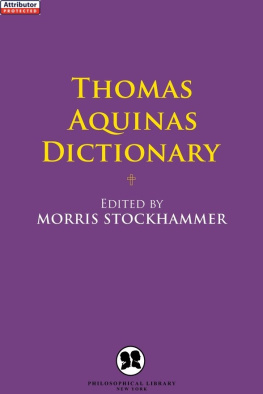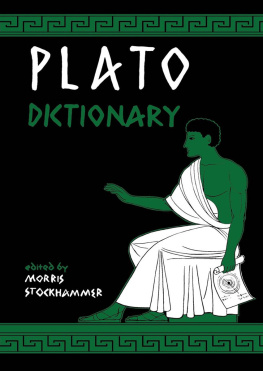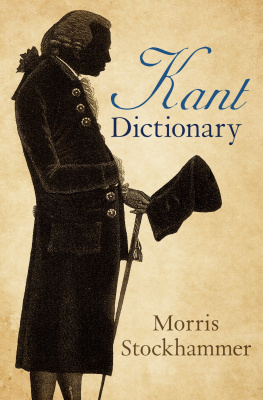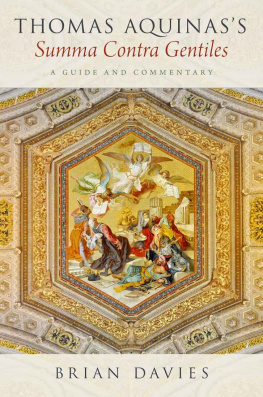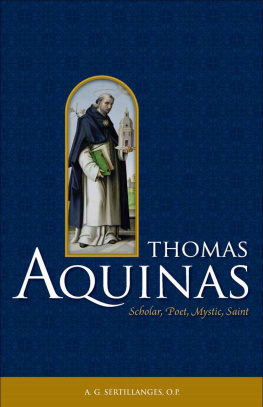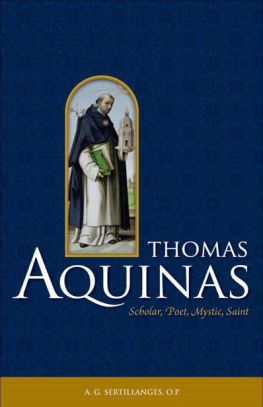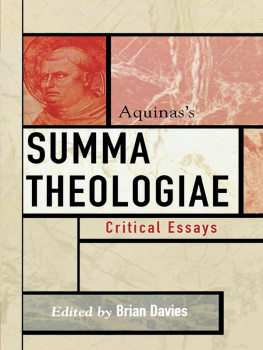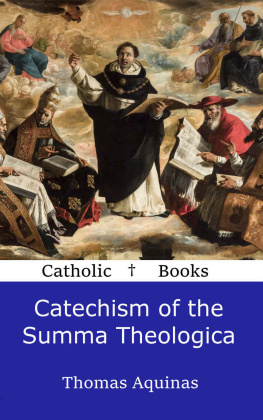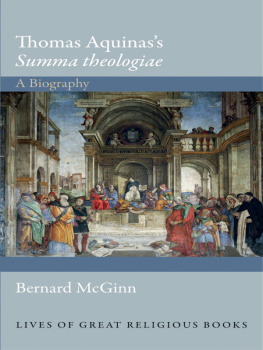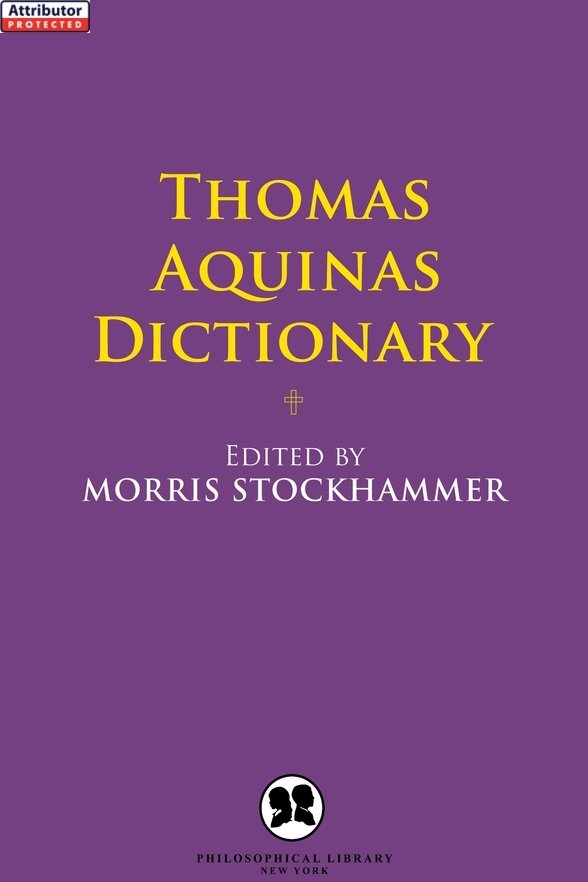A
ABSTINENCE
Abstinence helps to the gathering of wisdom.
II-II, q. 148, a. 6.
The good of reason cannot be in man, if he abstain from all pleasures.
II-II q. 142, a. 1, 2.
Some abstain for the health of their bodies.
II-II, q. 142, a. 1.
Abstinence by its name implies a subtraction of food.
II-II, q. 146, a. 1.
ABSTRACTION
There are two kinds of abstraction: the abstraction of the general from the particular, and the abstraction of the form from the matter.
I, q. 40, a. 3.
ACCIDENT
That which is outside the substance of a thing, and yet is belonging to the thing, is called an accident of it.
I-II, q. 7, a. 1.
That whose nature it is to exist in another.
I, q. 28. a. 2c.
ACCUSATION
A man ought not to proceed to accusation except upon a point that he is altogether sure of, so that ignorance of fact can have no place there.
II-II, q. 68, a. 3, 1.
Sometimes one is moved to accuse by a justifiable error.
II-II, q. 68, a. 3, 1.
Sometimes one proceeds to accusation from mere levity of mind, too easily believing what one hears, and that is rashness.
II-II, q. 68. a. 3, 1.
In the dignity of his person, a neighbor is injured openly by a judicial accusation, or by abusive language addressed to him.
II-II, q. 61, a. 3.
ACT
The act to which operative power is compared is operation.
I, q. 54, a. 3c.
Act, however, is duplex: first and second; first act is the form and integrity of a thing; second act is operation.
I, q. 48, a. 5c.
What is in potency is reduced to act only by a being in act.
I, q. 3, a. 1c.
There is nothing to hinder one act having two effects, of which one only is in the intention of the agent, while the other is beside his intention.
II-II, q. 64, a. 7.
There is a twofold act of the will, one immediately belonging to and elicited by the will itself; another commanded by the will and exercised through the medium of some other power, as walking and speaking, which are commanded by the will and exercised by means of the motive power.
I-II, q. 6, a. 4.
The interior act of the will and the exterior act, are morally one act.
I-II, q. 20, a. 3.
An act is human by being voluntary. Now a human act is evil for want of due proportion to some measure.
I-II, q. 71, a. 6.
Every act must be proportioned both to the object and to the agent. From the object it has its species: from the strength of the agent it has the measure of its intensity.
II-II, q. 26, a. 7.
In human acts the ends in view are as the principles in speculation.
I-II, q. 57, a. 4.
That act is properly human which is under the control of man.
I, q. 1, a. 4, a. 6c.
Acts done with delight are done with more attention and perseverance. But an extraneous delight would impede activity by distracting the attention.
I-II, q. 4, a. 1, 3.
ACT, GREAT
It is indeed a great act, relatively speaking, to make an excellent use of a trifle. But speaking absolutely, that is a great act which uses a grand thing excellently.
II-II, q. 129, a. 1.
ACT, MORAL
Moral acts stand in a different category from the performances of art. In the performances of art reason is directed to a particular end, which is something devised by reason: in moral performances it is directed to the general end of all human life.
I-II, q. 21, a. 2, 2.
ACT, PURE
God is pure act, receiving nothing from another, having no diversity in himself.
I, q. 90, a. 1c.
ACTION
The continued action of anything increases its effect.
I-II, q. 32, a. 2.
We are guided by knowledge to actions.
II-II, q. 166, a. 1.
Of the actions done by man, those alone are properly called human, which are proper to man as man. Now man differs from irrational creatures in this, that he is master of his own acts. Wherefore those acts alone are properly called human, whereof man is master.
I-II, q. 1, a. 1.
Action is twofold. There is one variety that proceeds from the agent to exterior matter, as the action of cutting and burning, and such an activity is a transient act of the patient. There is another action immanent, or remaining in the agent himself, as feeling, understanding, and willing.
I-II, q. 3, a. 2, 3.
ACTIVE
In the operations of the active life the lower powers concur, which are common to us with the dumb animals. However, in some particular cases, the active life is rather to be chosen for the necessity of our present life.
II-II, q. 182, a. 1.
ACTIVITY
It is manifest that activity is the last and crowning act of an active being. And hence it is that each thing is said to be for the sake of its activity. It needs must be therefore that the happiness of man is a certain activity.
I-II, q. 3. a. 2.
Activities are pleasant inasmuch as they are proportionate and connatural to the agent. But any activity exceeding that measure ceases to be proportionate or pleasant, and becomes rather laborious and wearisome.
I-II, q 32, a. 1, 3.
We gain fitting good by some activity; also the very activity itself that is proper to the agent is a certain fitting good. Hence all pleasure must follow upon some activity.
I-II, q. 32, a. 1.
Pleasure perfects activity as an active cause.
I-II, q. 34, a. 4.
ACTUALLY
He who has sown seed in his land has not yet got the harvest actually, but only virtually.
I-II, q. 62, a. 4, 1.
ADJUSTED
Things that are equalized are said to be adjusted.
II-II, q. 57, a. 1.
ADMONITION
Secret admonition should precede public denunciation.
II-II, q. 33, a. 7.
ADORATION
Even corporal adoration is in spirit, inasmuch as it proceeds from spiritual devotion and is directed to it.
II-II, q. 84, a. 2, 1.
A definite place is chosen for adoration, not for the sake of the God who is adored, as though He had local bounds, but for the sake of the adorers themselves.
II-II, q. 84, a. 3, 2.
ADULTERY
A man is injured by his wife in adultery, and that secretly for the most part.
II-II, q. 61, a. 3.
In adultery there is a twofold sin against chastity and the good of human generation: first, inasmuch as the adulterer cohabits with a woman not joined with him in wedlock, thus neglecting what is requisite for the good education of his own offspring; again, because he cohabits with a woman that is joined in wedlock with another man, thus hindering the good of another mans offspring.
II-II, q. 154, a. 8.
ADVICE
One takes advice in order to find out what is good for him.
I, q. 19, a. 7.
AFFABILITY
A man must be suitably ordered and adapted to his fellow-men in social intercourse as well in action as in word, that he may behave to each appropriately. And therefore there must be a special virtue that observes this suitable order; and it is called friendliness, or affability.
II-II, q. 114, a. 1.
AFFAIRS, HUMAN
Human affairs are handled in more orderly fashion, where every individual has his own care of something to look to; whereas there would be confusion if every one indiscriminately took the management of anything he pleased.

